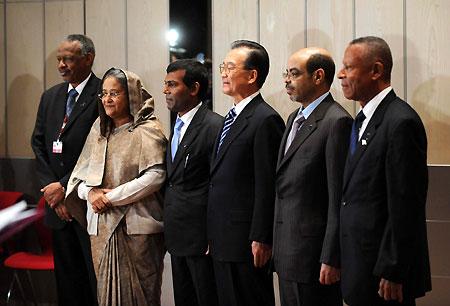Premier Wen: China's climate action not subject to international monitoring
2009-12-18 08:17 BJTSpecial Report: UN climate change conference in Copenhagen |
 |
| Chinese Premier Wen Jiabao (3rd, R) poses for a group photo with President of the Maldvies Mohammed Nasheed (3rd, L), Bangladeshi Prime Minister Sheikh Hasina (2nd, L), Ethiopian Prime Minister Meles Zenawi (2nd, R), Grenadian Prime Minister Tillman Thomas (1st, R) and Sudanese Presidential Assistant Nafie Ali Nafie (1st, L) ahead of their meeting in Copenhagen, capital of Denmark, on Dec. 17, 2009.(Xinhua/Liu Jiansheng) |
The Bali Action Plan, adopted by both developed and developing countries in 2007, lays down the basis for the current negotiations.
Disregarding what they have agreed, developed countries are trying to press China to accept international monitoring of its national mitigation action.
The United States said on Thursday it was prepared to join other rich countries in raising 100 billion U.S. dollars annually by 2020 to help developing countries combat climate change, but set a condition that emerging countries including China should accept international monitoring of its mitigation action.
Wen said China's refusal of international monitoring does not mean the country is afraid of supervision.
"It is a matter of principle, the principle of common but differentiated responsibilities," Wen said.
As the climate change negotiations dragged on, Wen said the important thing is to take action.

 Mail
Mail Share
Share Print
Print


 Video
Video









 2009 China Central Television. All Rights Reserved
2009 China Central Television. All Rights Reserved